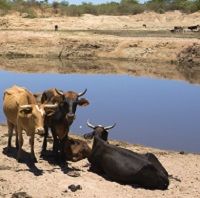Osteoporosis Risk Vastly Impacted by Historical Access to Dairy
Dairy farming began to alter human genetics 10,000 years ago. Now, those who can more readily tolerate milk are exponentially more likely to develop osteoporosis.

Compared to their counterparts in West Africa, East African women are 81 times more likely to suffer post-menopausal hip fractures. While this is an eye-popping enough disparity, American women are nearly 200 times more likely. Dairy-heavy diets and genetics play a role.
In a study published by Nature that reviewed records from 40 nations worldwide, University of North Texas researchers determined that populations with historically lower-calcium diets are at a much lower risk of developing osteoporosis. Dairy farming is practiced in East Africa, but in West Africa it isn’t, due to the tsetse fly scourge. The researchers referred to West Africans as “essentially immune” to osteoporosis.
85% of Europeans have the genetic trait that allows them to tolerate milk, at the cost of a much higher risk of osteoporosis. This “genetic tradeoff” began with the advent of dairy farming some ten millennia ago, and while it has expanded the diet among those in dairy-rich cultures with increased calcium and protein intake, it has also altered their bodies’ homeostasis.
Constance Hilliard, the study’s author, says research "needs to look at hereditary history and not put all races in a few categories." In her review, she found that Indians were often lumped in with Asia as a whole, despite Indian culture’s vastly different relationship with cows and dairy from other Asian societies.
Likewise, African Americans typically consume less calcium than Americans of European descent, and yet face much lower rates of the bone-weakening condition. This was once seen as a paradox, but in light of this information, is far more understandable.